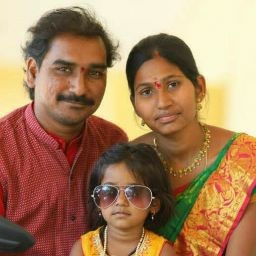Declaration of death
 M RAVI KUMAR
(Querist) 28 March 2013
This query is : Resolved
M RAVI KUMAR
(Querist) 28 March 2013
This query is : Resolved
Sir, I Ravi, Age-27 R/o Mahabubnagar, submit that, My father has murdered in 2001. My mother is one of the accused (A3) in the case, since our father's death we are not living with her and she was absconded to court trails since July 2003. Hence the court was splitted case in October-2005 and run against A1 & A2 and disposed off, A1 & A2 acquitted. Since our father is an Govt. employee we have still did not get any pensionary benefits due to her absence. As she is not living with us we have not filed any FIR in Police station, however the Police submitted their non traced report to the Court. Basing on the report court splitted the case. I have obtained the Warrants issued, Judgement copies from the court as certified copies which reveals that she was absconding since July-2003 and not traced so far. Therefore I request you sir kindly give me suggestion that, how to get the Declaration of Death from the court and whom I have to get be parties and how much time it will be takes. Thanking you,
 Advocate M.Bhadra
(Expert) 28 March 2013
Advocate M.Bhadra
(Expert) 28 March 2013
As per provisions of Indian Evidence Act if a person is not heard for seven years or more he/she is presumed to have been dead. So you can file a suit for declaration and you will get the declaration from the court.
If even after 7years you are not able to trace her in any manner you have to file case for Declaration in civil Court and produce all supportive papers for declaring that the said person is missing for more then 7 years and therefore to be declared as Dead.
Sec.32 INDIAN EVIDENCE ACT:-- Case in which statement of relevant fact by person who is dead or cannot be found, etc. is relevant -
Statements, written or verbal, of relevant facts made by a person who is dead, or who cannot be found, or who has become incapable of giving evidence, or whose attendance cannot be procured without an amount of delay or expense which, under the circumstances of the case, appears to the Court unreasonable, are themselves relevant facts in the following cases -
(1) When it relates to cause of death – When the statement is made by a person as to the cause of his death, or as to any of the circumstances of the transaction which resulted in his death, in cases in which the cause of that person’s death comes into question.
Such statements are relevant whether the person who made them was or was not, at the time when they were made, under expectation of death, and whatever may be the nature of the proceeding in which the cause of his death comes into question.
Declaration on death bed admissible: SC
Oct 19, 2001, in TIMES OF INDIA
New Delhi: in a major judgment widening the scope of evidentiary value of dying declarations, the supreme court has ruled that the effort of the trial courts should be how to bring such statements made by victims on their death beds, within the scope of substantive evidence. "as the possibility of getting the maker of the statement in flesh and blood has been closed for once for all, the endeavour should be how to include the statement of a dead person within the sweep of the substantive evidence and not how to exclude it there from," a bench comprising justice k t thomas and justice r p sethi held on thursday. this ruling was given by the bench after upholding a gujarat high court order, which had reversed the trial court order acquitting a person accused of burning a lady at a public place for allegedly talking to others about his illicit relationship with her sister. the high court, on reappreciation of evidence, relied on the dying declaration of the lady and convicted the accused of the offence and sentenced him to life imprisonment. dismissing the appeal of the convict, justice thomas said, the section 32(1) of the evidence act made two categories of dying declarations admissible in evidence and further made them substantive evidence. justice thomas said, "they are his statement as to the cause of his death; and his statement as to any of the circumstances of the transaction, which resulted in his death." the apex court said the second category could envelop a far wider amplitude than the first category. "the words 'statement as to any of the circumstances' are by themselves capable of expanding the width and contours of the scope of admissibility," justice thomas said. when the word 'circumstances' was linked to 'transaction which resulted in his death' the sub-section cast the net in a very wide dimension, he said. "anything, which has a nexus with his death, proximate or distant, direct or indirect, can also fall within the purview of the sub-section," justice thomas said narrating the wide variety of circumstances enumerated in the dying declaration, which could be made admissible. he said admissibility was the first step of examining a dying declaration and added once it is admitted the court has to consider how far it is reliable. "once that test of reliability is found positive, the court has to consider the utility of that statement in the particular case," justice thomas said. referring to a 1984 decision of a three-judge bench of the apex court, justice thomas said the majority decision laid down five propositions on the scope of section 32(1) of the evidence act. among them, the first was that the legislature has thought it necessary to widen the sphere of section 32 for avoiding injustice, he added.
 ajay sethi
(Expert) 28 March 2013
ajay sethi
(Expert) 28 March 2013
agree with Minansu Bhadra
 prabhakar singh
(Expert) 01 April 2013
prabhakar singh
(Expert) 01 April 2013
old wine in new bottle .....your query was addressed earlier with guidance what to do.?
WHY REPEAT THEN?????????????????
 Raj Kumar Makkad
(Expert) 01 April 2013
Raj Kumar Makkad
(Expert) 01 April 2013
There is no use to repeat the same query in changed title.
 ajay sethi
(Expert) 01 April 2013
ajay sethi
(Expert) 01 April 2013
oops did not relaise it was a repeated query
